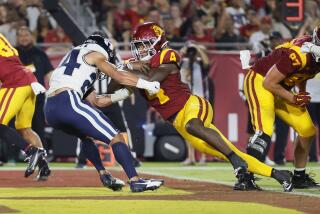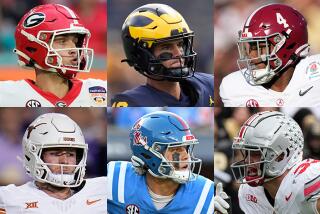COLLEGE FOOTBALL / GENE WOJCIECHOWSKI : Florida State Reverse Was the Smart Play
OK, so we miscalculated--sort of.
We predicted immediate wholesale changes in college conference alignments. Instead, only Penn State, Arkansas and Florida State have switched leagues or forfeited independent status.
We said that “superconferences” were making a beeline for the 1990s. Perhaps that should be the 2090s.
We boldly observed that Florida State was a natural for the Southeastern Conference, and that Miami wasn’t far behind. Needless to say, we, as well the SEC athletic directors, were surprised by the Seminoles’ recent decision to join the Atlantic Coast Conference.
Gracious losers that they are, the SEC athletic directors voted last week not to extend mighty Florida State an invitation to join. Of course, they did this after they learned the Seminoles had committed to the ACC.
Then, completing the classless farce, Louisiana State Athletic Director Joe Dean suggested that Florida State would regret the day it spurned the SEC. Dean went so far as to say that SEC teams should consider banning the Seminoles as future opponents.
As one might expect, few tears were shed for the SEC.
“The SEC was so aggressive, so overly aggressive, that it caused other conferences to defend themselves,” said Fred Jacoby, Southwest Conference commissioner. “They’re acting like a jilted lover, a jilted suitor. (The vote) was a face-saving technique.”
In retrospect, Florida State made the logical move. Instead of joining what would have been a 12-team Southeastern Conference (with plans for expansion), the Seminoles settled for the coziness of the now nine-team ACC. By doing so, they aligned themselves with a strong academic conference, they broadened their recruiting possibilities on the East Coast and they became instant favorites to win the ACC football championship in the first year they can play a complete schedule.
Florida State Coach Bobby Bowden preferred the ACC to the SEC for the last reason. No team, he reasoned, wins a national championship with an 8-3 record, which was a distinct possibility in the ultracompetitive SEC. In fact, LSU’s Dean revealed that Florida State was willing to join the SEC only if the Seminoles didn’t have to play Auburn and Alabama in the same season. The league declined.
But as always, the real reasons for the switch involve money. By accepting the ACC’s bid, Florida State has to share conference paydays with fewer members. And Florida State also will share in the ACC’s lucrative basketball television package.
Now, it’s time to rank the remaining favorites in the realignment race, beginning with . . .
MIAMI--The SEC has set its sights on luring the Hurricanes from independent status. Earlier this week, SEC Commissioner Roy Kramer met quietly with Miami officials. And rumors persist that Miami eventually could join the Southwest Conference or the ACC or even create an Eastern Seaboard Conference.
“Miami is kind of an interesting case,” said Jim Haney, Big West commissioner. “By the looks of it, Miami has positioned itself to join a conference, (but) I think they’ll end up being an independent.”
Jacoby disagreed. He said Miami would prefer to remain an independent but might have to join a conference simply because of scheduling considerations.
“Once the conferences start their play, it’s very hard to get an adequate schedule, especially during the months of October and November,” Jacoby said.
SOUTH CAROLINA--Potentially a better choice than the much-ballyhooed Hurricanes. South Carolina draws well in football and is strong in many other sports. The Gamecocks desperately would like an SEC invitation.
TEXAS and TEXAS A&M--Sure;, both schools said they are going to stay in the SWC . . . for now. But if the conference doesn’t make some drastic changes, the Longhorns and Aggies could bolt.
SYRACUSE--Don’t be surprised if the Orangemen join Penn State in the Big Ten, 11 and 12.
OKLAHOMA--The SWC covets the Sooners. “Oklahoma doesn’t add a lot of television (potential) to the conference, but it does add a marketable football and basketball program,” Haney said.
NEBRASKA--Another viable candidate for the Big Ten or the SWC. If the Cornhuskers and Sooners decide to stay put, it would be only because they received bigger distribution shares from the Big Eight.
BRIGHAM YOUNG--Under the right conditions, the Cougars might consider joining, say, the Pacific 10. But the Pac-10 has no plans to expand. Another possible alternative remains the SWC. The conference would become attractive only if Nebraska and/or Oklahoma join, too.
The SWC was in a near state of emergency a month and a half ago. Arkansas was leaving after 76 years in the conference. Texas and Texas A&M; were threatening to move, too. Since then, Jacoby has instituted policies designed to make the SWC more competitive.
For starters, Jacoby is pursuing the formation of a Big Eight/SWC superconference. He also is trying to schedule games against a “select” group of Eastern independents, most likely Syracuse, Pittsburgh and West Virginia.
Jacoby wants to adjust SWC schedules and revenue distribution. There is talk of an 11-game season over 14 weeks. The advantage: scheduling flexibility.
Ironically, Jacoby proposed similar plans several years ago to conference presidents, but was told that changes weren’t necessary.
During the off-season, Notre Dame’s Lou Holtz needed to hire a “volunteer” coach to oversee his receivers. In other words, he needed someone to work for free, mainly because the Notre Dame football staff already had the NCAA limit of nine paid full-time assistants.
Holtz found one, all right. Despite earning a weekly paycheck as a member of Colorado State Coach Earle Bruce’s staff, the assistant, who also coached receivers at Florida State for a wage, couldn’t resist Holtz’s job offer.
The assistant’s name?
Skip Holtz. Son of Lou.
Skip will receive no money from Notre Dame, though there is talk that Lou will increase his weekly allowance from 50 cents to $950.
More on Notre Dame: Quarterback Rick Mirer, who made his first start against Michigan last week, has more important things on his mind than football. His brother, Jeff, a member of the Army’s 82nd Airborne Division, is stationed in Saudi Arabia. Jeff Mirer also took part in the invasion of Panama. . . . Granted, the Irish have played just one game, but flanker Raghib (the Rocket) Ismail is already far behind BYU quarterback Ty Detmer in the Heisman Trophy race. . . . Only 30 more days until Miami travels to Notre Dame. In preparation, Irish students are selling T-shirts that read: “Catholics vs. Convicts III. Take no prisoners.”
It’s true: perennial loser Kansas State (2-0) has more victories than Colorado, Alabama and Penn State combined. . . . Speaking of Alabama, the Crimson Tide is 0-2 for the first time since 1984. They have four consecutive defeats over the last two seasons, the longest Alabama losing streak since 1956. You don’t think Phoenix Cardinal owner Bill Bidwill could have been right about Gene Stallings when he fired him? Nah. Unfortunately for Stallings, his Alabama team plays Georgia this week in Athens, Ga.
The full-time sacrificial lamb--and that can only mean Cal State Fullerton--deserves credit for giving Auburn an occasionally difficult time and then scaring Mississippi State. The Titans actually led the Bulldogs at halftime before losing, 27-13. . . . Cumberland University, the school that gave us the most lopsided defeat in college history--a 222-0 loss to Georgia Tech in 1916--returned to action after a 41-year hiatus. The Lebanon, Tenn., school played Campbellsville (Ky.) last Saturday. Cumberland, an NAIA Division II school that doesn’t award athletic scholarships, was beaten, 34-0. “It was a carnival atmosphere,” said Cumberland Coach Nick Coutras, whose team was together for only 3 1/2 weeks before playing its first game. “Everybody had a good time, except for us.”
Our Top 10: (1) Auburn, (2) Notre Dame, (3) Florida State, (4) USC, (5) Brigham Young, (6) Tennessee, (7) Virginia, (8) Texas A&M;, (9) Oklahoma, (10) Nebraska. On the waiting list: Florida, Houston, Miami and Washington.
More to Read
Go beyond the scoreboard
Get the latest on L.A.'s teams in the daily Sports Report newsletter.
You may occasionally receive promotional content from the Los Angeles Times.










